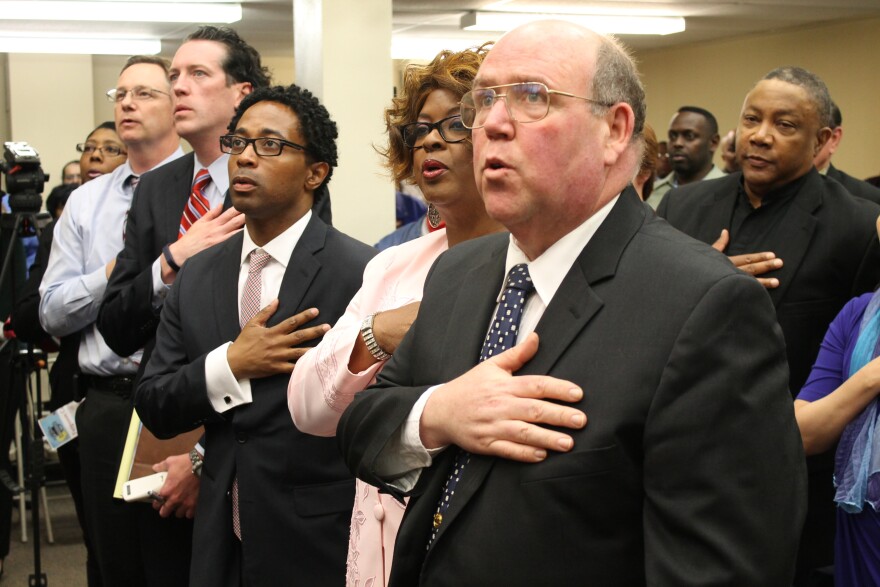Updated 9:40 a.m., Jan. 12 with funeral arrangements -Brian Fletcher, a former mayor of Ferguson and a new member of the City Council, died unexpectedly Sunday. He was 56.
Fletcher served two terms as mayor from 2005 to 2011. He also served as a Democratic committeeman for 16 years, as a member of the Ferguson-Florissant School District board, as an alderman for Country Club Hills, and as a member of the Ferguson 4th of July committee and pension board.
“Having him come back on the council, it was good for morale in the community,” said Ferguson Mayor James Knowles III in a telephone interview. “It was good for morale on the city staff. People knew Brian. They respected Brian. They knew him coming back on the council would help be a stabilizing force on the council.”
According to his Facebook page, Fletcher retired after serving as a former customer service adviser for AT&T. He previously served as Vice President of the Communications Workers of America (CWA) Local at AT&T. He was a graduate of Riverview High School.
Fletcher re-emerged in civic life in late 2014 after the national spotlight fell on Ferguson following the shooting death of Michael Brown by former city police officer Darren Wilson. Protests and unrest erupted, turning Ferguson into a symbol of the region’s underlying racial discord.
But Fletcher at the time said he was committed to helping businesses affected by the riots recover and to show that Ferguson was more than what was shown on television.
"I committed to every business that received damage, they will be 100 percent fully compensated," Fletcher said in October 2014. "Our public doesn’t know that the insurance policies these companies had does not cover acts of riot, war or terrorism. We want to make sure they stay here and thrive."
Fletcher formed and chaired the “I Love Ferguson” committee, which raised money by selling T-shirts, lawn signs and other items bearing its logo out of a storefront on South Florissant Road. According to Knowles, Fletcher’s group raised a total of $130,000.
After presenting a $50,000 check to help the region's businesses that were affected by the unrest, Fletcher marveled at how the "I Love Ferguson" slogan had become something of a worldwide phenomeon.
"We've shipped shirts to the United Kingdom, Italy and France," he said. "Our products are in 33 different countries. They've been shipped by relatives or they've been picked up here at the I Love Ferguson store and sent back to those countries."

Though facing opposition from a candidate backed by protest leaders and activist groups, Fletcher won one of the three open seats on the Ferguson City Council last April.
"What people are wanting is unity and to be able to move forward -- to get back some sense of normalcy in their lives," Fletcher said after he won his election over Bob Hudgins. "We've had a lot of things canceled or postponed over the past few months because of the unrest, and I think it's a signal to the protesters that they want their city back -- the citizens do."
Fletcher believed the city should enter into a consent decree agreement with the Department of Justice, after its report found the city police’s department violated the civil rights of African-American residents. He also said the city needed more hands-on policing.
But Fletcher said at the time that he was focused on maintaining and prioritizing the city’s finances in the face of such a costly consent decree to reform city policies and the police department.
“I believe that there will be a consent agreement, and we’ll be monitored by the Department of Justice for the next several years,” Fletcher said last March during his campaign. “And that’s an expense to the city. It’s not paid by the federal government. But I think we can be a much better community and have a much better productive professional police force.”
Ruffina Farrokh Anklesaria was one of the numerous volunteers who worked with Fletcher in the I Love Ferguson campaign. She said Fletcher's role as a spokesman and cheerleader for Ferguson in the midst of turmoil was invaluable.
"His legacy to the community is so great, it is hard to encapsulate it in just a few words," Anklesaria said. "He was really like our pillar, our foundation for what has been built since that crisis with Michael Brown."
Fletcher is survived by his wife of 34 years and two daughters, Alice and Sarah.
Visitation will be 4 p.m. to 9 p.m. Wednesday, Jan. 13 at Hutchens Mortuary and Cremation Center in Florissant.
The funeral mass is set for 10 a.m. Thursday, Jan. 14 at Blessed Teresa of Calcutta Church in Ferguson.








